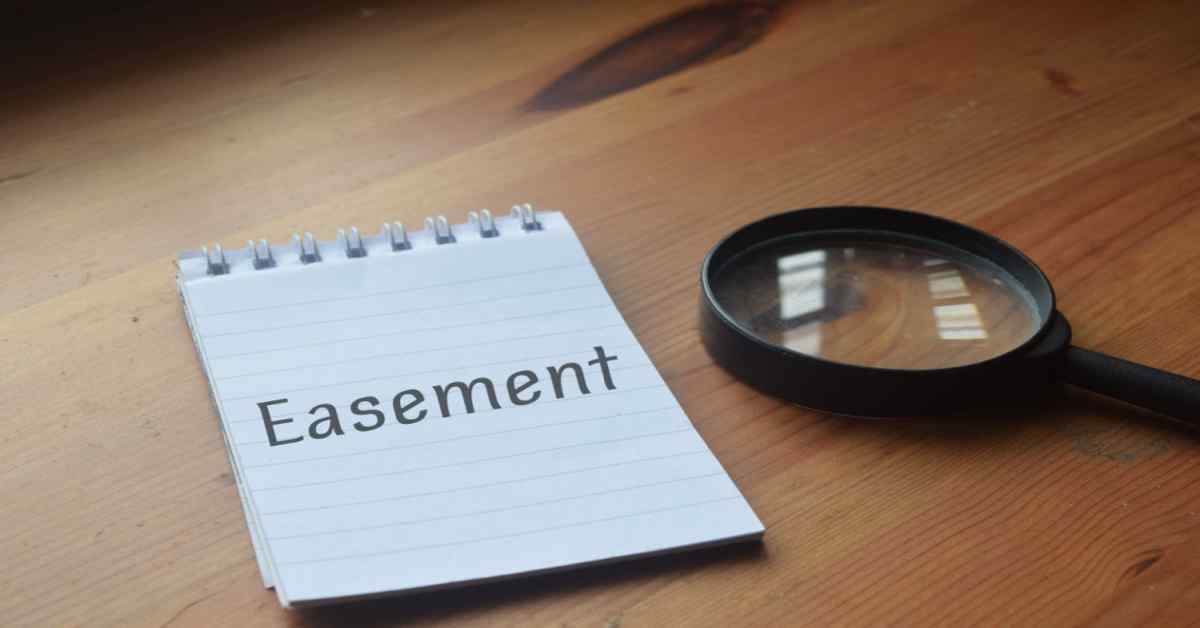Table of Contents
Quality Service Guarantee Or Painting Free

Get a rental agreement with doorstep delivery

Find the BEST deals and get unbelievable DISCOUNTS directly from builders!

5-Star rated painters, premium paints and services at the BEST PRICES!
Loved what you read? Share it with others!

Unravel the Secrets and Learn the Difference Between an Easement and a Licence
Table of Contents
Easements and Licences are two legal notions that allow one party to utilise or get access to the property of another party for a defined purpose. Although these two phrases may appear synonymous, the difference between easement and Licence is that they are separate legal notions with unique meanings and restrictions.
This blog post will explore the meaning, differences, examples, and Creation of Easement and Licence.
Meaning of Easement and Licence

A person or corporation can utilise or gain access to another person's land through easements and Licences, which are legal notions. While using someone else's land is a component of both Licences and easements, their legal ramifications and restrictions vary.
Quality Service Guarantee Or Painting Free

Get a rental agreement with doorstep delivery

Find the BEST deals and get unbelievable DISCOUNTS directly from builders!

5-Star rated painters, premium paints and services at the BEST PRICES!
Easement
A legal right to use or get access to a section of another person's property for a particular purpose is known as an Easement. Easements can be beneficial or harmful. A positive easement gives the owner permission to use the land in a certain way, for as, by walking across someone else's property to get to their own.
A negative easement forbids the landowner from doing something, such as erecting a structure that would obstruct the easement holder's view, on their property. Easements may be established explicitly, such as in a written contract or deed, or implicitly or as a result of a legitimate need, such as when a landlocked property is given an access easement over a neighbouring property to a public road.
Easements are property rights that may be purchased, sold, or transferred, substantially influencing a property's value and usage.
Licence
On the other hand, a Licence is a permit given by a property owner to a third party to utilise their land for a certain purpose. In contrast to an easement, a Licence is not a property right and may be cancelled at any moment by the landowner.
When a landowner wishes to permit short-term or restricted access to their property, such as permitting a neighbour to use a piece of their driveway or a business to utilise a specific area for a transient event, licences are sometimes employed.
Essentials of Easement and Licence

Various crucial factors must be considered when establishing or issuing an easement or Licence. It is essential to comprehend these components to ensure that both parties know their respective rights and duties.
The Essentials of Easement
The essentials of Easement are given below.
- Writing: For an easement to be enforceable, it must be signed by both parties and be in writing. This stipulation makes settling disagreements over the easement's terms and circumstances easier.
- Intent: An easement must be intended to be created, either explicitly or implicitly or out of necessity. The easement's particular terms and conditions, including its length, extent, and objective, must be agreed upon by the parties.
- Possessive and Subservient Tenement: The dominating and servient tenements are the two pieces of property involved in easements. The property that receives advantages from the easement is known as the dominant tenement, whilst the property that bears the burden of the easement is known as the servient tenement.
- Transferability: Subject to any restrictions or requirements outlined in the original agreement, easements may be transferred or assigned to another person or corporation.
- Maintenance: Unless otherwise stipulated in the agreement, the easement holder is responsible for maintaining and fixing any improvements or buildings connected to the easement.
Essentials of a Licence
The essentials of the Licence are given below.
- Permission: A Licence is an authorisation from the landowner to utilise their property for a certain objective. Although consent can be given orally or in writing, it is often best to have it in writing to prevent disagreements.
- Revocability: Unless otherwise stated in the licensing agreement, the property owner may revoke licences at any time. The licensee must follow all requirements or restrictions stated in the licensing agreement.
- Consideration: In exchange for the use of the property, licences may require the Licensee to pay the property owner money or consideration.
- Duration: Licences may have a set period or be revocable at the property owner's discretion. The length of the licence and any circumstances for its termination should be laid forth in the licensing agreement.
- Scope: The licensing agreement should outline the Licence's parameters, including the permissible use, the property area that may be utilised, and any restrictions or requirements. The Licensee must follow the extent of the licence and any limits outlined in the agreement.
Key Differences Between Easement and Licence

Both easements and Licences are legal notions that permit another person to access or use the land for a certain purpose. There are, however, several significant distinctions between the two.
- Rights to Property: An easement is a property right that enables the owner to utilise a certain area of another person's land for their benefit. On the other hand, a licence is not a property right; it is permission given by the property owner to use it for a certain purpose.
- Transferability: Easements are transferable, and the easement holder may sell, assign, or inherit their rights. On the other hand, licences are not transferable and cannot be sold, assigned, or passed down via the licencee's family.
- Duration: As long as the easement's terms and restrictions are followed, it might be permanent or temporary and can last forever. On the other hand, unless otherwise specified in the licensing agreement, licences are often only temporary and are subject to revocation by the property owner at any moment.
- Revocability: Unless under specific situations, such as when the easement holder violates the easement's terms and conditions, easements are often irrevocable. In contrast, unless otherwise stated in the licensing agreement, licences are often revocable at any time by the property owner.
- Scope: An easement often has a wider and longer-lasting scope than a Licence. Compared to Licences, easements might give the holder perpetual access to or use of a section of the land, typically for a short period and for a certain purpose.
- Compensation: Paying remuneration to the property owner in exchange for providing the easement is possible with easements. Payment of compensation may also be necessary for licences. However, it is rare.
Using or accessing another person's property is involved in easements and Licences. Still, they differ regarding property rights, transferability, duration, revocability, extent, and remuneration.
Therefore, to guarantee that the rights and duties of both parties are apparent and that future legal issues may be avoided, it is important to grasp these distinctions.
Illustrations of Easement and Licence

These are a few examples of an easement and a licence.
Easement
- Property owners have a right-of-way easement across their neighbour's driveway to access their land. The property owner does not own the driveway, but they can use it to enter their home. Although the neighbour still owns the driveway, they must maintain the property owner's access to their land.
- A utility company has an easement over a property owner's land to set up and maintain utility lines. But, for the utility provider to build and maintain the utility lines, the property owner must grant them access to the easement area.
- A person has permission to fish in a private pond on another person's land. The easement agreement grants people access to and the right to fish in the pond, even if they do not own it.
Licence
- A food truck vendor receives permission from a property owner to offer meals to consumers in their parking lot for one day. The Licence details the event's date and time, the parking space the vendor may use, and the licensing price.
- For a fee, a landowner permits a neighbour to park their automobile on their property for a predetermined time. The licence details the licence's length, the location of the parking space, and the payment amount.
- The owner grants the right to use a property as a shooting site to a film team. The licence lays out the dates for filming, the regions of the property that can be utilised, and any limitations on how the land may be used.
Creation of Easements and Licence

Different easements and licences may be created depending on the type of agreement, the property's characteristics, and the jurisdiction in which the property is located. Following are a few typical procedures for establishing easements and licences.
Creation of Easements
A few typical procedures for establishing easements are as follows.
Easement of Express
A signed agreement between the parties establishes an explicit easement. The agreement must specify the extent of the easement, its term, and any remuneration, if any, following the legal criteria for an enforceable contract.
Easement Implied
An implied easement is created when the parties' behaviour and the surrounding circumstances imply that the easement was intended or required. For instance, an implied easement may be created for the advantage of the sold piece to access a public road if a landowner divides their property into two parts, sells one lot, and keeps the other.
Easement by Prescription
When someone uses another person's property without the owner's consent for a certain purpose during a specific period, they acquire an easement by prescription. Its usage must be ongoing, unbroken, public, and well-known. The usage time must be at least ten years in various areas.
Creation of Licences
A few typical procedures for establishing a Licence are as follows.
Express Licence
An oral or written agreement between the parties grants an explicit Licence. The licence's scope, length, payment schedule, and other conditions must all be laid forth in the agreement.
Implied Licensing
An implicit licence is created when the parties' conduct and the surrounding circumstances suggest that the licence was intended or required. An implicit licence could be created for the length of the job, for instance, if a property owner permits a contractor access to their premises to undertake work.
Licensing through Estoppel
When a property owner misleads a third party into thinking they have permission to use their property, a licence by estoppel results. The property owner may be prevented from refusing the licence if the opposing party depends on it and incurs costs or acts.
While easements and licences are the same in enabling one party to use or access another party's land for a defined purpose, the difference between easement and Licence is that they are separate legal concepts with differing ramifications and limits. Easements are a type of property right that can be formed either explicitly or by implication or necessity, and they can substantially influence the value and usage of a property.
On the other hand, licences are permissions issued to another person by a property owner to use their property for a defined purpose that can be cancelled at any moment. Both property owners and people looking to utilise someone else's land should be aware of the variations between easements and Licences since they have various legal ramifications and restrictions that need to be considered.
By giving consumers access to pertinent data and tools, NoBroker, a real estate website, can assist users in understanding the distinction between easements and Licences. In addition, users may make informed judgments using the platform's extensive collection of property-related knowledge, including legal ideas and terminology.
Users can access articles on legal terms like Licences and easements that clarify their distinctions and give examples in NoBroker's blog area. In addition, via NoBroker's chat function, consumers can contact real estate professionals and attorneys who can answer any queries regarding easements and licensing and give more extensive and pertinent information.

FAQ's
Right-of-way easements, which let a person pass across another person's land, and utility easements, which provide a utility company access to a piece of a property to build and operate its equipment, are two kinds of easements.
An affirmative agreement between the parties can convert a Licence into an easement. However, the agreement must be in writing and be signed by both parties to satisfy the legal criteria for establishing an easement.
Certainly, a court order or mutual agreement between the parties can end an easement. Also, if the land is destroyed, the easement is no longer required, or the easement holder breaks one of its restrictions, it may be cancelled.
A Licence can indeed be exclusive, meaning that only the Licencee can utilise the property for that particular application. In commercial or business contexts, an exclusive Licence is frequently employed.
A Licence can let a neighbour use your driveway for a short while, or a company utilise a piece of your property for a momentary event. In addition, when a property owner wishes to permit brief or restricted access to their land, Licences are frequently employed.
Recommended Reading

Franking Charges Explained: Meaning and Benefits
January 31, 2025
1115333+ views

Society Maintenance Charges : Meaning, Cost, Types and Calculation
January 31, 2025
193115+ views

Revenue Stamp in India: Meaning, Types, Uses, Legal Value & Where to Buy in 2025
January 31, 2025
127492+ views

What are Society Transfer Charges as per the Housing Act and Rules in 2026?
January 31, 2025
82227+ views

What is the Difference Between Movable and Immovable Property?
May 1, 2025
70807+ views
Loved what you read? Share it with others!
Most Viewed Articles

Franking Charges Explained: Meaning and Benefits
January 31, 2025
1115333+ views

Society Maintenance Charges : Meaning, Cost, Types and Calculation
January 31, 2025
193115+ views

BBMP E-Khata Registration process for property owners in Bangalore, Karnataka in 2025
March 19, 2025
145603+ views

Daughter's Right in Fathers' Property - the Law is Finally Equal for both Genders?
June 1, 2025
132427+ views

Rectification Deed Format and Process in India 2025
June 1, 2025
127796+ views
Recent blogs in
How To Register a Rent Agreement Online In Gujarat: Process, Documents and Fees in 2026
January 19, 2026 by Ananth
What is Registered Lease Agreement: Meaning, Legal Validity, Benefits and Online Registration
January 19, 2026 by Krishnanunni H M
What Is a Room Rental Agreement: Meaning, Purpose and Importance in 2026
January 12, 2026 by Kruthi









 Full RM + FRM support
Full RM + FRM support
Join the conversation!